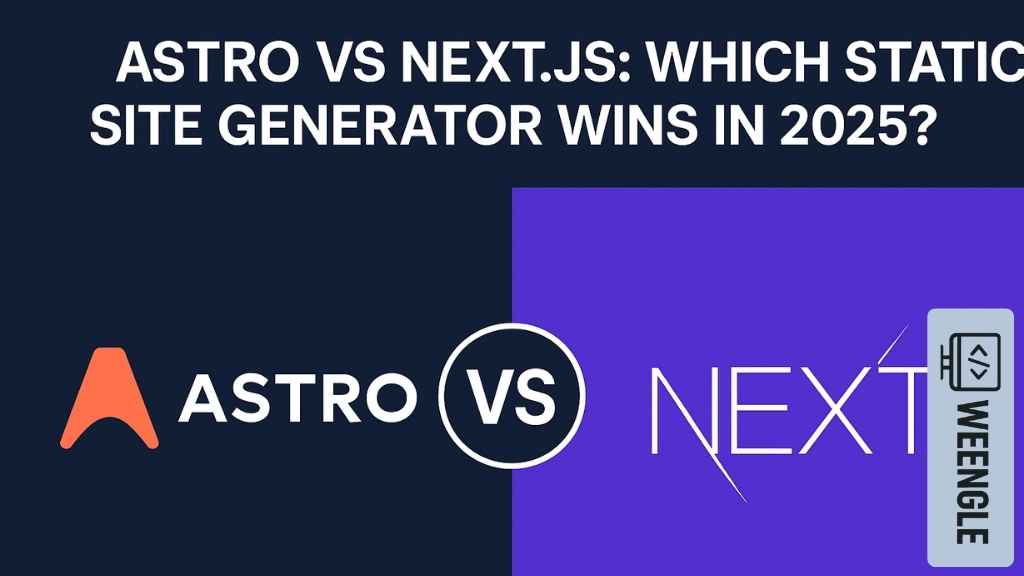In 2025, web development has evolved rapidly with a strong focus on performance, SEO, and developer experience. When it comes to static site generation, two frameworks continue to stand out: Astro and Next.js.
While both are powerful tools, they take very different approaches to building websites. Whether you’re a developer, content creator, or business owner, choosing the right static site generator (SSG) can make a huge difference in performance, scalability, and workflow.
What is Astro?
Astro is a modern static site builder that promotes a content-focused, performance-first architecture. Its unique feature is the “islands architecture”, allowing you to ship zero JavaScript by default, and only hydrate interactive components as needed.
✅ Key Features of Astro:
- Ships zero JS by default (unless needed)
- Supports React, Vue, Svelte, Solid, and more
- Lightning-fast performance
- Markdown & MDX support
- Excellent for content-heavy sites like blogs and documentation
What is Next.js?
Next.js is a React-based full-stack framework created by Vercel. It offers a hybrid model of static site generation (SSG), server-side rendering (SSR), and client-side rendering (CSR). With support for API routes, middleware, and edge functions, it’s a powerhouse for building complex, scalable applications.
✅ Key Features of Next.js:
- Full SSR/SSG/ISR support
- Powerful routing and file-system-based structure
- Great for eCommerce, SaaS, and dynamic apps
- Deep integration with Vercel’s edge platform
- App Router was introduced in v13+, now standard in 2025
Performance: Who’s Faster?
Astro
- Ships the least amount of JavaScript
- Uses static HTML by default
- Great Lighthouse scores
- Loads ultra-fast, especially for content sites
Next.js
- Can be fast, but heavier due to React
- App Router optimizes loading and caching
- Requires extra care to avoid JS bloat
📈 Verdict: For raw speed and lowest JS bundle size, Astro wins.
Developer Experience
Astro
- Lightweight and easy to learn
- Markdown-first with flexible component support
- Great documentation and plugin ecosystem
Next.js
- Powerful for full-stack needs
- Advanced features require React knowledge
- Larger learning curve, but extremely flexible
📈 Verdict: If you prefer simplicity and flexibility, go with Astro. For React veterans, Next.js still shines.
Use Cases in 2025
| Use Case | Best Choice |
|---|---|
| Content-heavy Blog or Docs | Astro |
| Headless CMS Frontend | Astro or Next.js |
| Full-stack Web App | Next.js |
| eCommerce Platform | Next.js |
| Developer Portfolio | Astro |
| Jamstack Site | Astro |
Ecosystem & Community
- Next.js has a larger community, more integrations, and enterprise support.
- Astro is catching up fast, with a growing open-source ecosystem and plugin support.
SEO & Core Web Vitals
- Astro‘s zero-JS output results in faster TTI and LCP, ideal for SEO.
- Next.js also performs well but may need more optimization for complex apps.
📈 Verdict: Astro offers better SEO out of the box.
2025 Trends & Developer Preference
In 2025, the trend is clear: performance-first and lightweight architectures are in demand. Astro embraces this by design. However, Next.js remains dominant in scenarios where full-stack functionality or complex dynamic rendering is needed.
Final Verdict: Who Wins in 2025?
| Criteria | Winner |
|---|---|
| Performance | ✅ Astro |
| SEO | ✅ Astro |
| Developer Flexibility | 🔁 Tie |
| Full-stack Capabilities | ✅ Next.js |
| Community & Ecosystem | ✅ Next.js |
| Ease of Use | ✅ Astro |
💡 Conclusion:
Choose Astro if you want a fast, content-focused site with minimal JavaScript and excellent SEO.
Choose Next.js if you need a scalable full-stack solution with powerful dynamic rendering and integrations.
FAQs
Q: Can I use React components in Astro?
Yes! Astro supports multiple frameworks, including React, Vue, and Svelte.
Q: Is Astro production-ready in 2025?
Absolutely. Astro is now used by top-tier companies and open-source projects.
Q: Does Next.js support static site generation in 2025?
Yes, it supports Server-Side Generation (SSG), Server-Side Rendering (SSR), and Incremental Static Regeneration (ISR).
Ready to Build in 2025?
Whether you pick Astro or Next.js, both are excellent choices. It all depends on your project’s needs. Focus on your content, performance goals, and developer experience.
✅ Tip: For a blazing-fast blog, go with Astro. For a dynamic dashboard or SaaS, Next.js is your friend.

